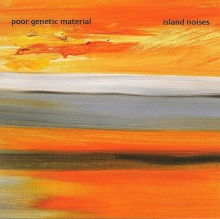MENNO VON BRUCKEN FOCK
ISLAND NOISES (E)

German musicians Stefan Glomb (guitars) and Philipp Jaehne (keyboards) used to work on soundtrack materia until they got in touch with Alias Eye, another German band. More song-oriented material followed and the duo became the band Poor Genetic Material (PGM) fronted by Phil Griffiths, the son of the legendary vocalist Martin Griffiths from Beggars Opera. Phil is an accomplished singer who sang about twenty years in the musical Phantom Of The Opera. Lyrically the duo has been inspired by Shakespeare’s The Tempest. Island Noises certainly doesn't contain ordinary ‘you love me, I love you’ kind of lyrics, but all the compositions were carefully written. If there would be something like ‘original’ or ‘classical’ symphonic rock, I guess PGM would be a could candidate to fit in that category. Only difference is that these guys have a trained vocalist. Most prog bands fail to have a really good singer. Although the combination of a trained musical singer with prog music might seem odd, it works very well indeed as can be heard in the opening track with a lot of characteristics from melodic progressive rock. The orchestral arrangements and the nice bass melody - played by Dennis Sturm - in the second track remind me of Eloy in the eighties, while Jaehne plays really well on the keyboards. Except for this awesome interlude A Dance So Strange is a catchy mid-tempo song with the emphasis on Griffiths' vocals and harmonies. In Brave New World we hear a nice pop melody with gentle clean guitars and some jazz influences, there might some Steely Dan influences there too; smoothly the music flows rather slowly. In the second part the flute reminds me of older records by Camel. A classical solo piano opens Let Them Beware followed by some harsh, echoing guitar sounds. The full band joins in with a bombastic chorus. The piano solo is sort of an interlude to the next up-tempo part until the bombastic chorus returns. Between the two last choruses there's again a strange very subtle melodic interlude. In the opening of Caliban’s Dream we hear the ex-Beggars Opera vocalist himself in a spoken poem. Beautiful subtle music again reminding of Camel (The Snow Goose) with changing tempos and everything that makes this kind of music so interesting. No doubt the masterpiece is the epic title track Island Noises. The opening is played by echoing clean guitars and organ. Again the spoken words are performed by Martin Griffiths. Some influences of early Marillion can be heard when the music changes in style: an instrumental interlude with some psychedelic touches, mostly guitars and keyboards. After about six minutes influences of Eloy return with the full band playing, as another interlude a bit of ‘Camel meets Canterbury’. After about thirteen minutes yet another change of style but still very melodic and catchy. When the music and the drums seem to lose the connection, there are suddenly guitars and Griffiths singing a pop tune. The style and tempo may be compared to Phil Collins’ version of You Can’t Hurry Love. In between another interlude by piano and guitar. The last part is a nicely built up theme. It starts off as pop music in the style of Fiction Factory or China Crisis, but gradually it becomes majestic symphonic rock.
The first track on the second CD is a sequel to the finale of the title track, but after a few minutes it changes into a seventies pop-rock tune with sliding guitars. At the end of the track the melody of the first part returns and Glomb gets a chance to excel on the guitar. In Assassins And Sleepers we hear semi-acoustic guitars, bass and piano in a way that reminds me more or less of Genesis. Then the music sort of transforms into a lush kind of symphonic pop until at some point at the end a theme used earlier returns. Organ, electric guitar and subtle orchestrations form a symphonic opening of In A State Of Grace, a mid-tempo rock song, with nice seventies influenced slower instrumental interludes, the second one a bit in the style of Camel again. Some reciting by Martin Griffiths and dreamy music, changing into a more up-tempo jazz influenced instrumental piece. Halfway the vocal part is different, more influences of great prog bands like Marillion, while the last part of the song is an awesome instrumental piece by keyboards and acoustic guitars in the vein of Anthony Phillips. Sycorax is an instrumental piece featuring piano, keyboards and flute with some influences from Jade Warrior, so a slight and distinct oriental touch. A melancholic ‘classic symphonic’ feel in Ariel especially because of the Mellotron sounds. Same applies to the next track Drowning The Book although there are also more modern rocking pieces, with in the middle-section a delightful instrumental interlude by keyboards. The last track is also quite complicated with all sorts of melodies and different styles. From musical, pop and rock to bombastic majestic symphonic music featuring keyboards, as it should be in my opinion. In the middle a nice piece featuring Glomb’s acoustic guitar. The grand finale is a slow majestic piece with a lot of keyboards and melodic soloing by Glomb. So the answer to the ‘does real prog rock still exist’ kind of question is definitely yes!
Poor Genetic Material proves that it's possible to come up with original songs in the genre of progressive rock with more than enough points of interest for people who usually would listen to other genres. One of the finest releases in prog-rock in 2011 in my opinion.